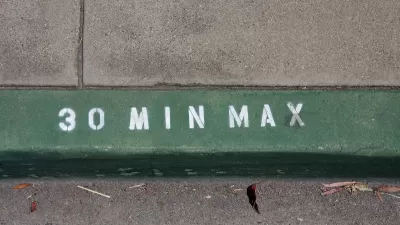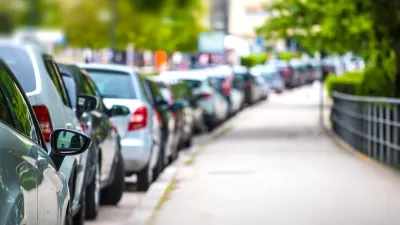What's causing underground parking spaces to go for $160,000 in Beijing? Quartz reports that demand, narrow roads, resident disenfranchisement and old zoning law give developers the upper-hand.
Gwynn Guilford writes of $100,000 parking spaces commonly found in Beijing. Underground parking contributes to China’s real estate speculation, led by “greedy property developers” and growing demand for automobiles. The article stresses that two variables account for why Beijing has some of the world’s most expensive parking spaces: growing car ownership and lack of proper legal knowledge and enforcement means residents pay exorbitant rates—perhaps on parcels they already own.
Thee real backstory here, according to Guilford, is that: “Zoning plans haven’t kept up with Beijing’s embrace of car culture; many slightly older developments were designed without allotting ample parking spaces," and on-street parking is rarely permitted.
The issue is more nuanced: “Beijing has among the lowest ratio of roads per overall land area of any major metropolis in the world…“ and with a population of 7.5 million cars—or a car for every 2.5 residents—private parking is prioritized. While the government vows to reduce a million cars by toying with the license plate lottery, that impending policy has created a "car buying surge" and with it, a "parking spot bubble" in real estate. Values even 30 miles from Beijing’s core cost more than the car itself.
Guilford details further Chinese property laws and elaborates on why residents are willing to pay inflated rents. This, she writes, is due to lack of knowledge about property law or the legal channels to enforce the law, meaning that developers contribute to the scarcity and exact skyrocketing prices “…for a parking space that [residents] legally own.”
FULL STORY: Parking in some areas of Beijing now costs more than $160,000

Maui's Vacation Rental Debate Turns Ugly
Verbal attacks, misinformation campaigns and fistfights plague a high-stakes debate to convert thousands of vacation rentals into long-term housing.

Planetizen Federal Action Tracker
A weekly monitor of how Trump’s orders and actions are impacting planners and planning in America.

In Urban Planning, AI Prompting Could be the New Design Thinking
Creativity has long been key to great urban design. What if we see AI as our new creative partner?

King County Supportive Housing Program Offers Hope for Unhoused Residents
The county is taking a ‘Housing First’ approach that prioritizes getting people into housing, then offering wraparound supportive services.

Researchers Use AI to Get Clearer Picture of US Housing
Analysts are using artificial intelligence to supercharge their research by allowing them to comb through data faster. Though these AI tools can be error prone, they save time and housing researchers are optimistic about the future.

Making Shared Micromobility More Inclusive
Cities and shared mobility system operators can do more to include people with disabilities in planning and operations, per a new report.
Urban Design for Planners 1: Software Tools
This six-course series explores essential urban design concepts using open source software and equips planners with the tools they need to participate fully in the urban design process.
Planning for Universal Design
Learn the tools for implementing Universal Design in planning regulations.
planning NEXT
Appalachian Highlands Housing Partners
Mpact (founded as Rail~Volution)
City of Camden Redevelopment Agency
City of Astoria
City of Portland
City of Laramie




























